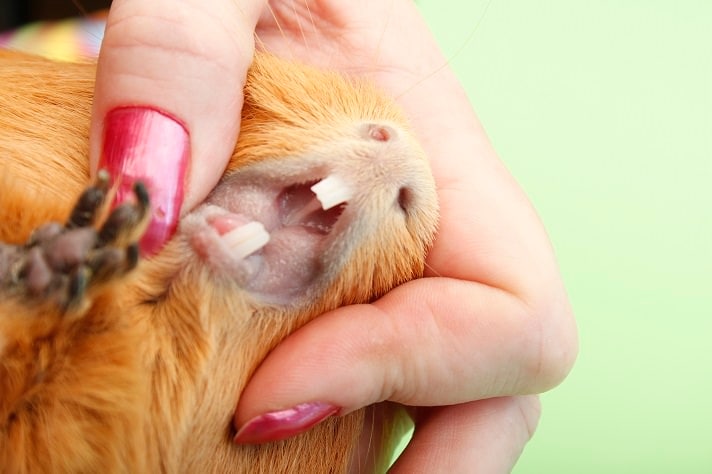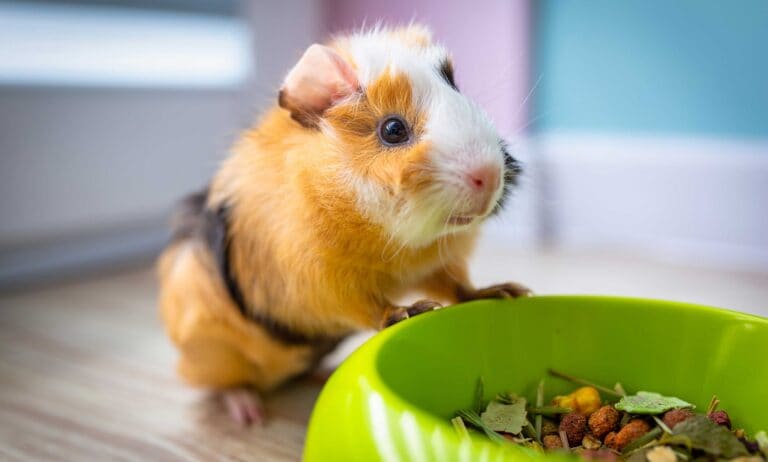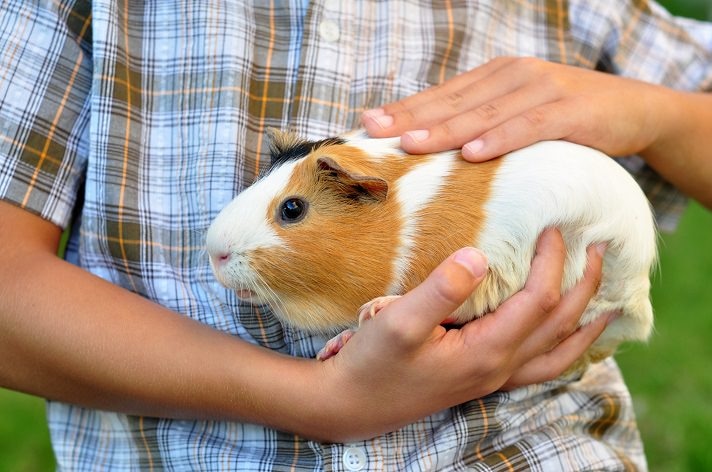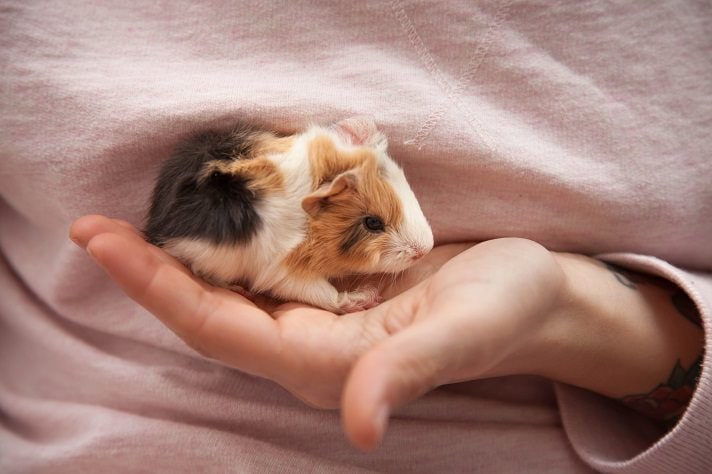Is your guinea pig drooling? How about its droppings — are the fecal pellets smaller and harder than normal, or maybe they are larger and softer? Does it have “poopy butt,” meaning the fecal pellets are staining or sticking to the fur? Is it losing weight and seems to be hungry all the time? Any of these may indicate a problem with your guinea pig’s teeth, and a visit to the veterinarian is needed.
Causes Of Guinea Pig Tooth Trouble
Let’s look at why our pet guinea pigs have so many problems with their teeth. The wild ancestors of guinea pigs fed on tough grasses, leaves and bark. Grass is very tough and packed with fiber, and has high levels of silica as a defense, the same compound found in sand. Chewing on grass is hard work, and the teeth are constantly being worn down by the combination of silica and fiber. In order to cope with the constant wearing away of the teeth, guinea pigs evolved incisors and cheek teeth that grow continuously.
Pet guinea pigs need to chew things that resemble the grasses and plants their wild cousins eat in order to keep their teeth in shape. Unfortunately, many pet guinea pigs are offered too much of the wrong sort of Guinea Pig Food
, and their teeth and jaw muscles are not properly exercised. Without this chewing and grinding activity, the teeth may grow into unusual shapes. Once the teeth do not line up with each other, the food particles are not ground into the proper size for digestion. Sometimes the teeth develop sharp points that can cause ulcers on the tongue or the side of the mouth. The cheek teeth on the lower jaws may lean inward and trap the tongue, which prevents the guinea pig from swallowing food normally.
If a guinea pig does not swallow the right size of food, especially if it is not getting enough fiber with each mouthful, it can create problems with fermentation and digestion, leading to soft stool and diarrhea, or sometimes small hard dry stools. The abnormalities in the mouth may cause the guinea pig to drool, or to be reluctant to eat due to the painful sores in its mouth. A guinea pig with a trapped tongue may act starved, and may chew food only to have it fall out of its mouth.
The wrong diet is the most common cause of dental problems in pet guinea pigs. A guinea pig should always have available a large amount of high-quality timothy hay, which forces the guinea pig to chew and physically grind down the biting surface of the cheek teeth. Softer foods do not stimulate a guinea pig to chew vigorously side-to-side like it does for timothy hay. Timothy hay also provides enough fiber to promote their gastrointestinal health, so it’s a double dose of goodness.
Teeth can also shift in position and become maloccluded and misaligned due to scurvy, a disorder resulting from insufficient vitamin C in the diet. An adult guinea pig needs at least 90 milligrams of vitamin C daily in order to maintain the health of its teeth. Without this vitamin C, the tissues holding the teeth in place become too flexible, and the teeth will loosen and shift position. Once the teeth are loose, they start to hurt, and the guinea pig may start to prefer eating soft foods and avoid its hay. Very quickly, a guinea pig with scurvy will develop malocclusion problems with its teeth.
Dental problems may develop in a guinea pig for a variety of other reasons. For example, some guinea pigs may be born with abnormally shaped teeth, skull or jaw bones that simply don’t line up for proper grinding. Injuries to the mouth, skull or jaw bone may cause the teeth to grow at odd angles. Tumors may start to deform the shape of the teeth. Infections may develop.
Evaluating A Guinea Pig’s Teeth
When a guinea pig has signs of dental disease, a trip to the veterinarian is essential. A radiograph of the skull may be needed, to better understand the health of the roots of the teeth, and to see if there are any other changes in the bones of the skull that may be affecting your guinea pig’s health. The veterinarian should offer to examine and photograph your guinea pig’s mouth using an endoscopy, which will provide a clear image as a reference for future examinations. The oral endoscopy helps the veterinarian better understand what is going wrong, and allows you to see the changes in your pet’s mouth. This endoscopic examination has to be done under general anesthesia; a guinea pig may need to be treated with assist-feeding and other medications before it is stable enough to undergo this procedure.
Once the teeth have been evaluated, the veterinarian may recommend different treatments. Sometimes, it is a simple matter of filing the abnormal teeth back into a shape that promotes normal chewing. Teeth may need to be extracted, and treatments with antibiotics, anti-inflammatory medications, and other medications may be needed. Some guinea pigs will need liquid diets assist-fed afterward, and in rare cases a guinea pig may need a feeding tube placed in the side of its neck to allow feeding while its mouth heals.
Some guinea pigs require such frequent teeth filing that extraction of the abnormal teeth is a better option. Occasionally a guinea pig may need all four front teeth (incisors) extracted because they grow in at such abnormal angles and require filing every few weeks. Extraction of an incisor is a delicate procedure and a guinea pig will require lots of special attention afterward until its mouth heals. Fortunately, most guinea pigs do quite well without any incisors. Some guinea pigs have had all their cheek teeth removed and do well.
The Importance Of Oral Endoscopy
The pictures here were taken inside the mouth of different guinea pigs using an endoscope. The endoscope helps magnify the teeth and reach deep inside the mouth to detect problems that would otherwise be overlooked. A thorough endoscopic examination of the mouth is essential for any guinea pig that is showing trouble eating or drinking.
Managing And Preventing Dental Disease In Guinea Pigs
To help your guinea pig have healthy teeth, the single most important thing you can do is to measure out the amount of pellets your pet guinea pig eats. Never free-feed pellets and always have timothy hay available; this ensures that your guinea pig chews enough timothy hay to wear down its teeth. Pellets should be offered so that the whole bowl is eaten within a few hours and the rest of the time your guinea pig has to eat the hay.
For adult guinea pigs, I recommend 1/8 cup of a vitamin C-enriched timothy hay-based pellet daily. For pregnant guinea pigs, the pellets should be increased in amount so there is always some in the bowl. (But three weeks after she has had her babies, cut back to 1/8 cup!) For growing guinea pigs, we recommend that you always have the bowl full with a pellet designed for growing animals. Vitamin C-rich fresh fruits and produce should be offered too, such as parsley, bell peppers, and small pieces of oranges. Consult with your veterinarian about any special needs your guinea pig may have.
Provide at least 90 milligrams of vitamin C to your guinea pig every day as a special supplement. This is a minimum amount; you may safely give 125 milligrams without worry. This can be a product such as Oxbow’s Daily C, or a chewable vitamin C tablet for humans, or a liquid vitamin C for humans. Use a chewable table that contains 250 milligrams vitamin C, and break it in half for your guinea pig. Most human liquid vitamin C products have 250 milligrams per one teaspoon (5 ml) of liquid, so 1/2 teaspoon (2.5 ml), or a little less, of this is about the right amount for most guinea pigs. If you are using a human product and are not sure how much to use, double-check the concentration with a veterinarian so you can be sure you are giving the right amount to your guinea pig. Guinea pigs might not get enough vitamin C if it’s offered in water, because it’s difficult to know how much water a guinea pig drinks each day. If you have doubts, consult your veterinarian.
Make sure to bring your guinea pig in for regular physical exams performed by an experienced veterinarian who will check the length and condition of your pet’s teeth. If your guinea pig has ongoing problems, an oral examination should be scheduled at least every four months so that the veterinarian can tackle problems before they impact your pet’s health.
A guinea pig may show early signs of dental problems such as drooling, stained or matted fur on its chin and jaw, a loss of appetite, a shift in appetite to only its favorite foods, or a change in the quantity or consistency of its feces. If you are at all concerned that your guinea pig may be developing dental disease, please get it to a veterinarian as soon as possible!
By: Kevin Wright DVM, Diplomate ABVP (specialist in reptiles and amphibians)
Featured Image: Via Gina Cioli/Lumina Media
Share:









